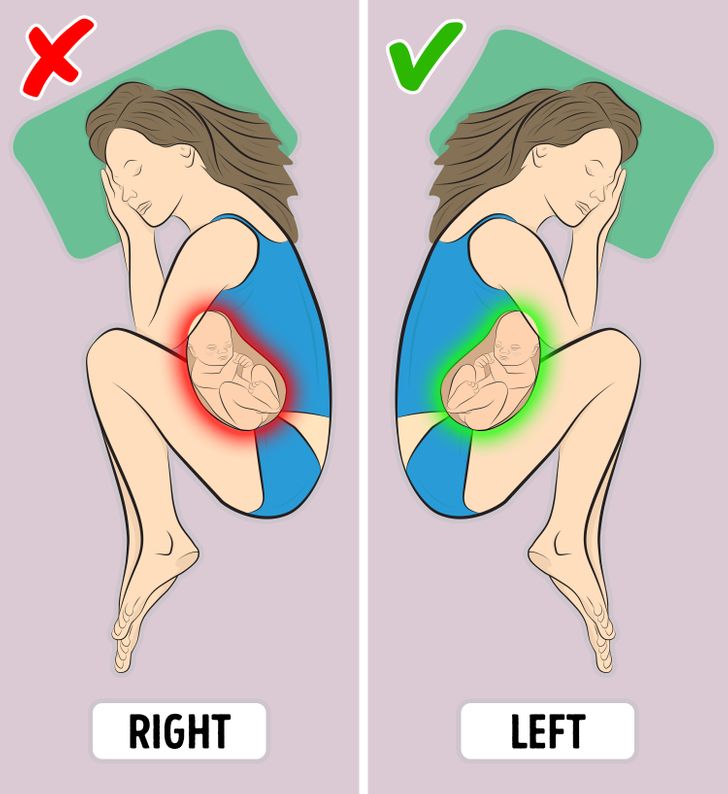
Disadvantages of Sleeping on Your Right Side: What Your Body Isn’t Telling You
Sleep is one of the most essential aspects of human health, affecting everything from brain function to immune system strength. While most people understand the importance of getting enough sleep, few realize that the position they sleep in can have a significant impact on their health. One commonly adopted sleeping position is lying on the right side. It may feel natural or comfortable, but recent research suggests that this position may come with hidden health drawbacks. Sleeping on your right side might be silently affecting your body in ways you haven’t considered.
Firstly, one of the most concerning disadvantages of sleeping on the right side is its effect on digestion. The human stomach is shaped like a J, and it sits slightly to the left of the abdomen. When you sleep on your right side, gravity causes the stomach’s contents to press against the lower esophageal sphincter (LES), which is the valve that separates the stomach from the esophagus. This can lead to acid reflux or heartburn, especially in individuals who already suffer from gastroesophageal reflux disease (GERD). In contrast, sleeping on the left side helps keep the junction between the stomach and esophagus above the level of gastric acid, reducing the chances of reflux.
In addition to digestive problems, sleeping on the right side can also negatively affect heart health. The human heart is located more towards the left side of the chest. Some studies have found that right-side sleeping may reduce the efficiency of heart function, particularly in individuals with pre-existing heart conditions. This position can compress the vena cava—the large vein that carries deoxygenated blood back to the heart—making it harder for the heart to pump efficiently. Left-side sleeping, on the other hand, allows for better circulation and is often recommended for pregnant women for this reason.
Another issue with right-side sleeping is its impact on lymphatic drainage. The lymphatic system plays a vital role in removing toxins and waste products from the body. The thoracic duct, which is the main vessel of the lymphatic system, is located on the left side of the body. When you sleep on your left side, gravity can assist in the movement of lymph fluid through this duct, promoting more efficient detoxification. Conversely, sleeping on the right side may hinder this natural process, allowing toxins to accumulate over time and possibly leading to long-term health issues.
Furthermore, sleeping on the right side might not be ideal for people who snore or suffer from sleep apnea. Some studies suggest that right-side sleeping can worsen symptoms by narrowing the airway more than the left side does. This restriction can lead to increased snoring and disrupted sleep, which negatively affects overall rest quality and daily energy levels.
Lastly, though often overlooked, right-side sleeping may contribute to facial asymmetry or premature skin aging. When people sleep on one side regularly, the pressure on that side of the face can cause compression lines, reduced blood flow, and even contribute to wrinkles over time. This is more of a cosmetic issue, but for those concerned about skin health and appearance, it is worth noting.
In conclusion, while sleeping on the right side might feel comfortable in the short term, it may be doing more harm than good over the long run. From digestion and circulation to lymphatic drainage and skin health, the disadvantages of this sleeping position are more significant than many realize. Becoming more conscious of your sleeping posture—and making simple changes, such as switching to the left side—could lead to better health outcomes and improved sleep quality. Your body may not be telling you outright, but the signs are there if you know where to look.
News in the same category


Seniors: the 1 simple ingredient that quickly rebuilds muscle

Doctors warn: this 1 cancer sign may show up in your sheets

How Water Fasting Can Regenerate the Immune System, Slow Aging, Reduce Heart Attack Risk and More

4 Reasons Why Cardiac Arrests Happen in The Bathroom

Shoulder Pain from Sleeping: Causes, Solutions and More

Cancer hates these 6 fruits—eat them to fight back!

Canadian Researchers Discover New Evidence That Vitamin D Shuts Down Cancer Cells

Signs of Arthritis You Shouldn’t Ignore

Research Reveals Two Life Stages of Accelerated Aging

9 Convincing Reasons to Consume More Dates

Unlocking the Hidden Potential of Papaya Seeds: A Nutritional Treasure

Garlic & Black Pepper: The Kitchen Cure for Leg Pain and More

Castor oil for older adults: key benefits and safety tips you shouldn’t miss

Top 10 signs of a gallbladder attack

Which fruit prevents cancer cells from growing rapidly?

Does The Inside Of Your Ear Itch

A Natural Remedy for Thinning Hair

Simple Aloe Vera Trick Will Leave Your Skin Glowing
News Post

The fish that is the "king of omega-3," with salmon only ranking second: Sold everywhere in Vietnamese markets at incredibly low prices.

Tips for using rice water and ginger to nourish your hair, promoting faster growth and making it thicker, darker, and shinier.

Treat premature gray hair with a black dye formula made from sour starfruit and potatoes, as cheap as can be!

How to store chili peppers for months while keeping them as fresh as the day they were picked, with firm, plump flesh that doesn’t dry out or lose flavor.

10 people eat avocado, but 9 of them discard this part without realizing it's a "treasure."

How to help you travel thousands of miles without getting motion sickness.

Stick an Urgo Patch on Your Fan: A Clever Trick That Brings Amazing Benefits—Don’t Miss Out if You Haven’t Tried It

Tips to Prevent Blackening of Pots When Using a Gas Stove: Very Simple, Everyone Should Know

Drink coffee THIS way to protect and reverse liver damage caused by alcohol

Seniors: the 1 simple ingredient that quickly rebuilds muscle

Doctors warn: this 1 cancer sign may show up in your sheets

Don’t Throw Away Bubble Wrap — Keep It in Your Kitchen to Discover These Amazing Benefits

Revive Your Nails with This Garlic Secret

17 Natural Habits to Keep Your Colon Healthy

7 Nettle benefits and uses

7 Benefits Of Papaya Seeds & How To Consume Them Correctly

How Water Fasting Can Regenerate the Immune System, Slow Aging, Reduce Heart Attack Risk and More

4 Reasons Why Cardiac Arrests Happen in The Bathroom

Shoulder Pain from Sleeping: Causes, Solutions and More
